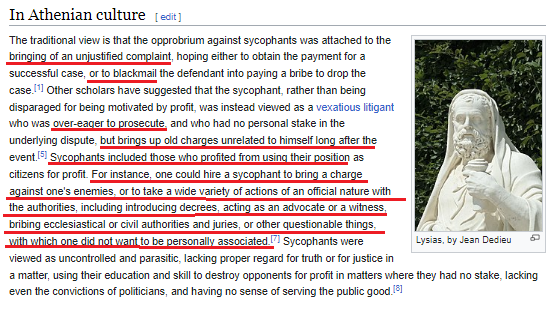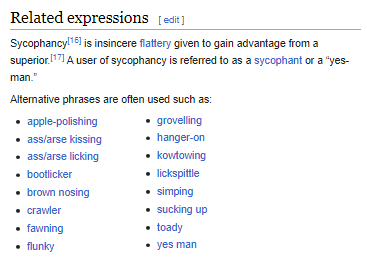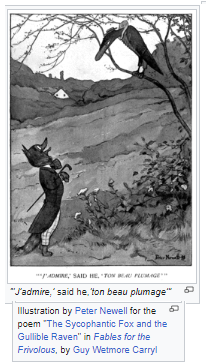Essays Contents
Sicophants
March 7, 2023

Gouveia reads the Sicknick letter
I could not find a link to the original letter,
only references to it. Many reports quoted from it.
But... where could it be? ...the Sicknick letter...
So... Gouveia's podcast of it... shall make do.
Just to prove... context... a blurred screenshot.
(and link to the podcast)
Robert Gouveia - March 7 Podcast
Gouveia is reading "the Sicknick letter of response" to the Tucker Carlson
broadcast (of Monday March 6, 2023)...
when he reaches the point in the letter that refers to Trump fans as "sycophants."
He stops abruptly...
just for a moment... then continues on with the reading.
And there I am... not knowing for certain... what a sycophant is!
After my reading of a few lines at
en.wikipedia.__org/wiki/Sycophancy
In modern English, sycophant denotes an "insincere flatterer" and is used to refer to someone practising sycophancy (i.e., insincere flattery to gain advantage).
The word has its origin in the legal system of Classical Athens. Most legal cases of the time were brought by private litigants as there was no police force and only a limited number of officially appointed public prosecutors.
By the fifth century BC this practice had given rise to abuse by "sycophants": litigants who brought unjustified prosecutions.[1]
The word retains the same meaning ('slanderer') in Modern Greek,[2] French, (where it also can mean 'informer') and Italian. In modern English, the meaning of the word has shifted to its present usage.
I didn't check the reference links...
but thought... they might be of interest.

Etymology =====================
And then I saw "Etymology"
(which means word origin/history)
Well... I HAD to keep reading.
And it was just... so... interesting.
It was becoming like... a detective story... intrigue...

the breaks are my editing
"The origin of the Ancient Greek word (Greek font) (sykophantes) is a matter of debate, but disparages the unjustified accuser who has in some way perverted the legal system.[1]
The original etymology of the word (sukon/sykos/(aukoc) 'fig', and phainein/fanes/(oavnc Greek font) 'to show') "revealer of figs"—has been the subject of extensive scholarly speculation and conjecture. Plutarch appears to be the first to have suggested that the source of the term was in laws forbidding the exportation of figs, and that those who leveled the accusation against another of illegally exporting figs were therefore called sycophants.
Athenaeus provided a similar explanation. Blackstone's Commentaries repeats this story, but adds an additional take—that there were laws making it a capital offense to break into a garden and steal figs, and that the law was so odious that informers were given the name sycophants.
A different explanation of the origin of the term by Shadwell was that the sycophant refers to the manner in which figs are harvested, by shaking the tree and revealing the fruit hidden among the leaves.
The sycophant, by making false accusations, makes the accused yield up their fruit. The Encyclopædia Britannica Eleventh Edition listed these and other explanations, including that the making of false accusations was an insult to the accused in the nature of "showing the fig", an "obscene gesture of phallic significance" or, alternatively that the false charges were often so insubstantial as to not amount to the worth of a fig.[3]
Generally, scholars have dismissed these explanations as inventions, long after the original meaning had been lost.[4][5]
Danielle Allen suggests that the term was "slightly obscene", connoting a kind of perversion, and may have had a web of meanings derived from the symbolism of figs in ancient Greek culture, ranging from the improper display of one's "figs"
by being overly aggressive in pursuing a prosecution,
the unseemly revealing of the private matters
of those accused of wrongdoing,
to the inappropriate timing of harvesting figs when they are unripe.[5][6]

Which reads thusly:
This poem was published in Wetmore’s 1898 anthology
Fables for the Frivolous, which are parodies of Aesop's Fables
A raven sat upon a tree,
And not a word he spoke, for
His beak contained a piece of Brie,
Or, maybe, it was Roquefort:
We’ll make it any kind you please—
At all events, it was a cheese.
Beneath the tree’s umbrageous limb
A hungry fox sat smiling;
He saw the raven watching him,
And spoke in words beguiling.
“J’admire,” said he, “ton beau plumage.”[1]
(The which was simply persiflage.)
Two things there are, no doubt you know,
To which a fox is used:
A rooster that is bound to crow,
A crow that’s bound to roost,
And whichsoever he espies
He tells the most unblushing lies.
“Sweet fowl,” he said, “I understand
You’re more than merely natty,
I hear you sing to beat the band
And Adelina Patti.
Pray render with your liquid tongue
A bit from Götterdämmerung.”
This subtle speech was aimed to please
The crow, and it succeeded:
He thought no bird in all the trees
Could sing as well as he did.
In flattery completely doused,
He gave the “Jewel Song” from Faust.
But gravitation’s law, of course,
As Isaac Newton showed it,
Exerted on the cheese its force,
And elsewhere soon bestowed it.
In fact, there is no need to tell
What happened when to earth it fell.
I blush to add that when the bird
Took in the situation
He said one brief, emphatic word,
Unfit for publication.
The fox was greatly startled, but
He only sighed and answered “Tut.”
The Moral is: A fox is bound
To be a shameless sinner.
And also: When the cheese comes round
You know it’s after dinner.
But (what is only known to few)
The fox is after dinner, too.

And I couldn't finish this essay without throwing THIS in...

Odd wordage.
Wikipedia has interesting editors...
In fact, you can sign in as an editor...
and read the history of the page edits.
Sicknick's wife/family/lawyers... gots some fancy talk.


Gouveia reads the Sicknick letter




